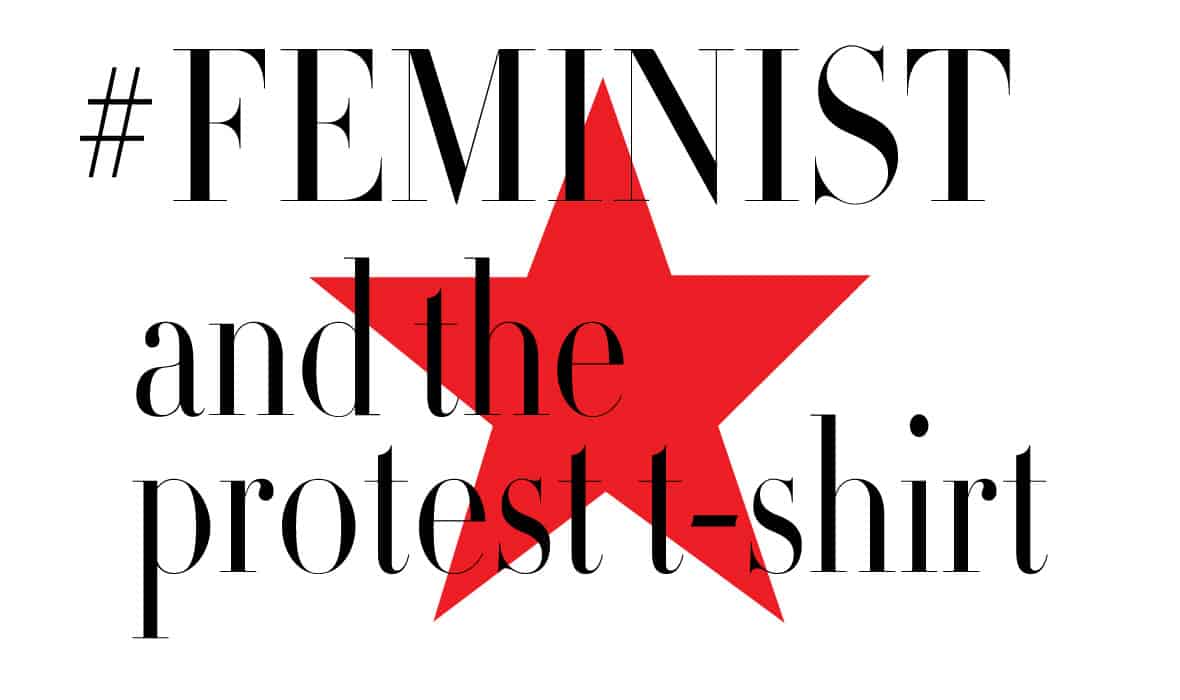#Feminism and The Protest T-shirt
There can be no question that 2018 is the year of the protest t-shirt. There is much in the world that is making us grumpy and yes, that means we’re printing it on a tee and out into the world. Protest t-shirts are not new, SpectraUSA has charted this colored history extensively, but if you are looking for a banner year for the protest tee, this one has got to be it for protest movements, social unrest, disgruntled folks around the world and a plethora of protest t-shirts to write it all down on. And, if you’ve been paying any attention to social media, you’ll know that the protest t-shirt slogan of our time is the one-word misogyny killer: #feminist.
We’ve seen the big labels and heavy-hitters of fashion design get in on the action too: Dior’s ”We should all be feminists” t-shirt opened up high fashion brands to the phenomenon and woke something of an insatiable fashion beast to the urgency of the protest tshirt in 2018. Riffing off Nigerian writer Chimamanda Ngozi Aichie’s eponymous literary work-and equally powerful TED talk-Dior scored a fashion bullseye, even if the shirt did retail for around $700. Not to be outdone, everywhere brand Topshop chimed in with Tea & Cake’s ”Feminist” T-shirt which, in the age of Donald trump, certainly made a bold statement with the black and white contrasting print.
Although some were quick to criticize the rapid commodification of the feminist movement at the hands of Big Fashion which, with major labels jumping on the protest bandwagon, may seem justified; it seems balanced by the enduring nature of the protest movement and how the ,movement seems to have gone from strength to strength in spite of a fairly rampant merchandising exercise. Many celebrities have also gotten in on the action, donning the protest t-shirt of their favorite cause and, once that happens, well the message of emancipation is writ large over social media but also in fashion’s bottom line, further driving the sales of these tees.
From ”Feminist” through ”Time’s Up” to ”Me Too” the protest tees of the day are feminist, proud and stark emblems, not only of a hoped for social change, but of a social movement in action. Perhaps this is the real difference between the feminist messages of the 1960s and 1970s t-shirts and those of today. The tees of the protests of yesteryear were describing a hoped-for change whereas the protest tshirts of our own time are describing a reinvigorated movement in process and one which, for all intents and purposes, seems to be accelerating.
Just taking a glance at social media feeds these days, the hashtags #feminist or #feminism seem to be everywhere, so why not on the world’s favorite items of clothing, the t-shirt? Hasn’t the t-shirt has always been the analogue version of personal social media? ThisÊ great space on the front of the chest broadcasting a personal message-but in true analogue form-only one message with limited opportunity for any feedback? In the highly digital age of #MeToo the protest t-shirt has remained a valuable analogue message, reinforcing the presence and visual currency of the movements as they gain momentum (or is that Mom-entum?) and declare women powerful, radical and deeply engaged agents of our social spaces be they digital or analogue.
When it comes to t-shirts change has always been writ large and the person who best taught us to do that was yes, another woman, famed British designer Katharine Hamnett. We profiled Hamnett’s ”writ large” creations some time ago, and any modern designer creating for the protest movement needs who hasn’t seen her emblematic and potent work needs to stop what they’re doing immediately and take a look.
Again, it was Hamnett who famously warned us that ”T-shirts by themselves are all very nice but they achieve nothing.” And she’s right. Good design and clever slogans are meaningless unless the wearer carries the message with them and lives it. Hamnett demonstrated exactly how this works when she met Margaret thatcher. Realizing that there would be a photo opportunity, Hamnett donned a plain white tee with the words ”58% don’t want Pershing,” a statistic from a poll regarding English attitudes to the deployment of American Pershing missiles in the UK. As Hamnett shook Thatchers hand she let her coat fall open revealing the famous tee, the photographers did their job and a particularly radical message-not the one Thatcher’s team would have wanted-was sent spiraling through the media.
On many levels it is gratifying to see movements like ”Times up” and MeToo” gaining ground and attention in the public consciousness. For some, the shirts are simply a trendy way to dress in these giddy times. For others it will be a powerful message, carried by them through all of the public spaces they inhabit on the medium which seems to have been perfectly designed for just this sort of thing: The protest t-shirt.
SpectraUSA’s range of 100% cotton ring-spun t-shirts are the printer’s and protester’s dream. Light-weight, stylish and tailored, these shirts offer a gorgeous printing surface with fit and comfort to spare. Insist on Spectra’s 3100 Cotton Perfection for the ultimate light weight 30 singles protest tee, or the traditional 2100 Retro ring-spun t-shirt for rocking it old school. Once you’ve put it on Spectra its there to stay, the only question left to answer is: What does your t-shirt say?
